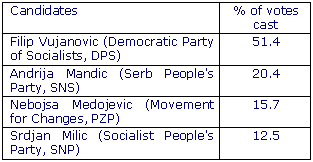News
Corinne Deloy,
Fondation Robert Schuman,
Helen Levy
-

Available versions :
EN

Corinne Deloy
Fondation Robert Schuman
Helen Levy
Outgoing Head of State Filip Vujanovic (Democratic Party of Socialists DPS) was re-elected head of Montenegro during the first round of the presidential election that took place on 6th April. He won 51.4% of the vote ahead of Andrija Mandic (Serb People's Party, SNS) 20.4%, Nebojsa Medojevic, chairman of the Movement for Changes (PZP) 15.7% and leader of the Socialist People's Party (SNP), Srdjan Milic 12.5%.
Turn out rose to 69% which was far higher than the figure recorded in the presidential election that took place on 11th May 2003 (+ 20.6 points).
"I won for Montenegro and its future," declared the Head of State as soon as the results were announced confirming that he "would be the President of the Republic of all of the people of Montenegro". "The consensus with regard to a pro-European policy embodied by the Democratic Party of Socialists and the President of Montenegro is constantly growing," stressed Prime Minister Milo Djukanovic (DPS) as he welcomed the victory of a loyal ally. "The candidates who were against the independence of Montenegro two years ago (Andrija Mandic and Nebojsa Medojevic) have no moral right to lead the country," declared Filip Vujanovic. "I am really expecting victory in the first round," he indicated after voting in Podgorica.
The outgoing President's victory anchors more firmly the position and role of the Democratic Party of Socialists; it has governed the country for the last 17 years. "We won independence, we now have to work for a better life, new values and start the fight for Montenegro to enter the European Union. The elections show that the majority of Montenegrins support our policy and want to continue the country's integration into the European Union," maintains Filip Vujanovic.
"I am not happy with the results which show that the citizens of Montenegro are still not ready to support a democratic candidate," declared Nebojsa Medojevic when the results were announced. The leader of the Movement for Changes said however that he was "very optimistic" maintaining that "this evening I shall proclaim the victory of the Montenegrin democratic opposition which will herald the end of a totalitarian regime. Montenegro is an independent country but it still needs to become a free, democratic State and to rid itself of its corrupt, dictatorial regime," he maintained.
During the entire campaign Andrija Mandic defended "Serb" rights in Montenegro. "Whatever one might say Montenegro is still a Serb State," he repeats. The Serb People's Party candidate is also the leader of the Serbian List, a coalition that rallies, the Party of Serb Radicals (SSR) led by Tomislav Nikolic, the People's Socialist Party (NSS) led by Novo Vujosevic, the Democratic Party of Unity (DSJ) led by Zoran Zizic, the Serb National Council (SNV) led by Momcilo Vuksanovic and Academic Alternative led by Vojin Grubac.
53 year-old, Filip Vujanovic is a law graduate from the University of Belgrade. When working as a lawyer he started his political career in 1993 as Justice Minister (1993-95) then Home Minister (1995-98) in the government led by Milo Djukanovic. In 1997, when the Democratic Party of Socialists (DPS) split in two, one side led by Momir Bulatovic, then close to former Serb president Slobodan Milosevic, and the other led by Milo Djukanovic, Filip Vujanovic remained loyal to the latter. In 1998, he was appointed Prime Minister, a post he occupied until the general elections on 20th October 2002 before becoming President of the Montenegrin Parliament. On 11th May 2003 after the invalidation of two presidential elections which he easily won (but in which only half of the voters registered took part, leading to the invalidation of the elections) Filip Vujanovic became President of Montenegro, a post to which he was re-elected on 6th April.
Once again the DPS candidate has won in Montenegro. The opposition forces have certainly paid the price for their division and disorganisation. However the Montenegrin political arena is still plagued by several divisions (liberals/state socialists, "Serbs"/independence supporters) which make it difficult to read the problems faced by society in a coherent manner – likewise it is difficult to draw up a programme that will rally a majority of citizens. It seems that voters have never considered any of the other three candidates as true alternatives to the DPS.
Results of the 1st Round of the Presidential Election in Montenegro on 6th April 2008
Participation rate: 69%
 Source: Agence France-Presse
Source: Agence France-PresseOn the same theme
To go further
Elections in Europe
Corinne Deloy
—
4 November 2025
Elections in Europe
Corinne Deloy
—
28 October 2025
Elections in Europe
Corinne Deloy
—
14 October 2025
Elections in Europe
Corinne Deloy
—
7 October 2025

The Letter
Schuman
European news of the week
Unique in its genre, with its 200,000 subscribers and its editions in 6 languages (French, English, German, Spanish, Polish and Ukrainian), it has brought to you, for 15 years, a summary of European news, more needed now than ever
Versions :



